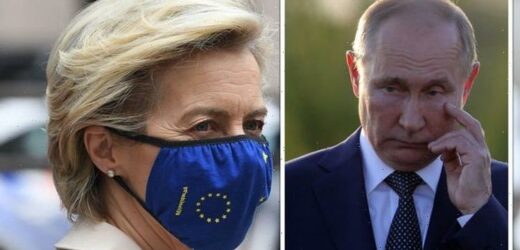China 'making Arctic states nervous' over relations says expert
We use your sign-up to provide content in ways you’ve consented to and to improve our understanding of you. This may include adverts from us and 3rd parties based on our understanding. You can unsubscribe at any time. More info
Russian President Vladimir Putin has claimed the European gas market “does not look to be well balanced and predictable” following a global shortage. He pointed the finger at “the consumer of gas,” as opposed to the producer and said a push for renewable energy was one of the main reasons. It comes after Russia’s gas giant Gazprom started withdrawing gas from its storage facilities to stabilise the gas market.
But the EU risks further antagonising the situation by announcing moves to support the reduction of oil and gas exploration taking place in the Arctic region.
According to the EU Arctic Policy to be unveiled today, Brussels will aim to convince partner countries to agree to the plan.
The draft says: “The EU shall work with partners towards a multilateral legal obligation not to allow any further hydrocarbon reserve development in the Arctic or contiguous regions, nor to purchase such hydrocarbons if they were to be produced.
“The EU will push for oil, coal and gas to remain in the ground.”


But the Arctic is geostrategically critical as it is viewed as resource-rich, especially in rare earth elements.
When ice-cover melts, it is predicted that there will be a global competition to mine those riches and to explore new shipping routes.
And China, Russia and the US are already battling for dominance in the region.
This explains why the EU is now also competing for influence in the region.
The EU draft says the EU “establish a European Commission Office in Nuuk, Greenland in order to strengthen and enhance EU-Greenland cooperation” as it plans to exploit its natural materials.

The move also comes as the EU races to meet its climate targets ahead of the COP26 climate summit in Glasgow, taking place in under three weeks.
Arctic fossil fuel extraction is a key source of greenhouse gas emissions and the EU believes it needs to stop this in order to meet its 2015 Paris Agreement in a move to decarbonise the planet.
It will also call on increasing the existing curbs on Arctic fossil fuel exploration in the Arctic in areas of the US, Canada, and Greenland.
The Arctic is a rich source of fossil fuels with around 13 percent of the world’s undiscovered oil and 30 precent of undiscovered natural gas, according to a US Geological Survey estimate.
China has boosted its interest in the region over the last few years, with increased investment and an eye on new transport routes opening up as ice caps melt to make way.
Russia has also stepped up military activity in the region.
DON’S MISS
Russia sends terrifying threat as millions of Britons face winter cris [INSIGHT]
Scientists baffled by radio waves coming from Milky Way centre [REPORT]
Macron leads rebellion as EU nations form alliance against Gemany [REVEAL]


The EU’s plan is no doubt a plan to limit competing powers in the region as it lags behind.
The draft says: “Building resilient EU value chains through sustainable raw materials extraction and processing will help the Arctic region to develop sustainably through innovation and circularity.”
The move come after Mr Putin played a hand in the soaring gas prices when he restricted the flow of gas travelling into Europe.
The Russian President stuck up a deal with Angela Merkel to see gas exported from Russia to Europe through the newly built Nord Stream pipeline.
But in a bid to avoid EU law applying to the pipeline system as well as speed up the certification process, Mr Putin tightened gas supplies travelling into Europe from other pipelines.
Source: Read Full Article


